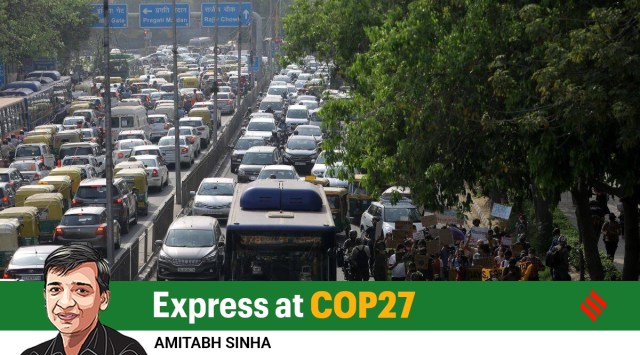Early Warning System for the entire world in next five years
The programme, launched by UN Secretary General Antonio Guterres, envisages an investment of $ 3.1 billion between now and 2027 to create the infrastructure and build capacities in early warning systems.
 The WMO statement said the Global Commission on Adaptation had found that spending about $ 800 million on early warning systems could avoid losses up to $ 3-16 billion every year.
The WMO statement said the Global Commission on Adaptation had found that spending about $ 800 million on early warning systems could avoid losses up to $ 3-16 billion every year.Taking forward the initiative of the India-backed Coalition for Disaster Resilient Infrastructure (CDRI) at last year’s climate meeting , the World Meteorological Organisation on Monday unveiled a five-year programme to set up early warning systems across the world to save lives and minimise destruction from growing number of climate disasters.
The programme, launched by UN Secretary General Antonio Guterres, envisages an investment of $ 3.1 billion between now and 2027 to create the infrastructure and build capacities in early warning systems. Nearly half the countries in the world, most of them least developed an small island states, do not have any early warning systems, the WMO said.
“Early warnings save lives and provide vast economic benefits. Just 24 hours notice of an impending hazardous event can cut the ensuing damage by 30 per cent,” WMO Secretary-General Petteri Taalas said at the launch of the initiative.
The WMO statement said the Global Commission on Adaptation had found that spending about $ 800 million on early warning systems could avoid losses up to $ 3-16 billion every year.
Last year, CDRI, an international organization formed three years ago with India’s backing, had come up with a similar plan, focused mainly at the small island states. That programme, called IRIS, or Infrastructure for Resilient Island States, was not meant only for early warning systems, but most of the initial interest it had received from the small island states was regarding help in setting up these systems.
India’s Environment Minister Bhupendra Yadav, who was present at the launch of the WMO programme, said New Delhi fully backed the new initiative as well. Yadav recalled India’s own success in building a robust early warning infrastructure, which has saved hundreds lives and avoided large-scale destruction.
“Over the last few years, we have made concerted efforts towards making early warning impact-based as well as more easily understandable and actionable by communities…. As an example, the number of lives lost has been minimised, being limited to 100 due to tropical cyclones during the last 10 years, not just in India, but in all the countries in the Bay of Bengal and Arabian Sea region,” Yadav said.
“We would now like to maximise the full potential of Early Warning Systems for not just reducing the loss of lives, but also livelihoods and national development gains. India has spearheaded the Coalition for Disaster Resilient Infrastructure (CDRI), which is working towards developing applications of climate forecast and early warning for reducing infrastructure losses and disruption in basic services,” he added.
Guterres also attended an event with Pakistan Prime Minister Shehbaz Sharif at the Pakistan pavilion and called for more international help to the country that, in September, had witnessed its worst flood.
“Pakistan deserves massive support directly from the international community. Pakistan deserves loss and damage to be considered as a reality and for that reality to be recognized through financial mechanisms that I hope this conference will be able to decide,” Guterres said.
- 01
- 02
- 03
- 04
- 05































